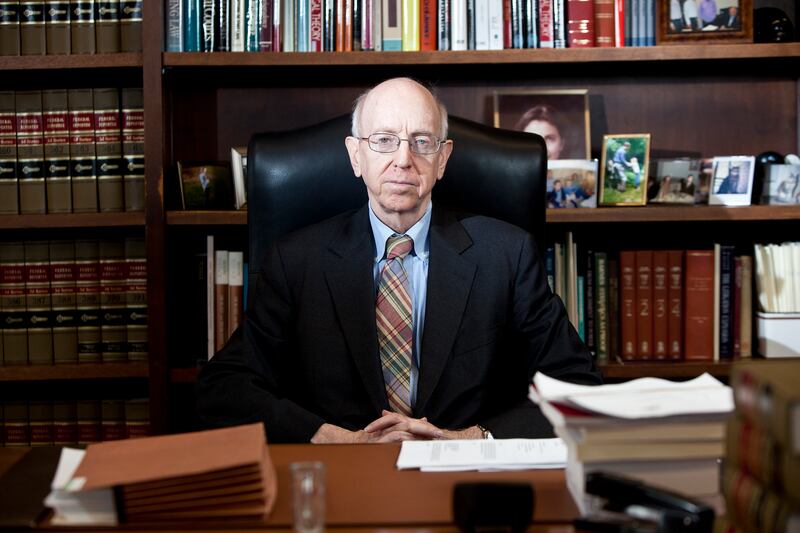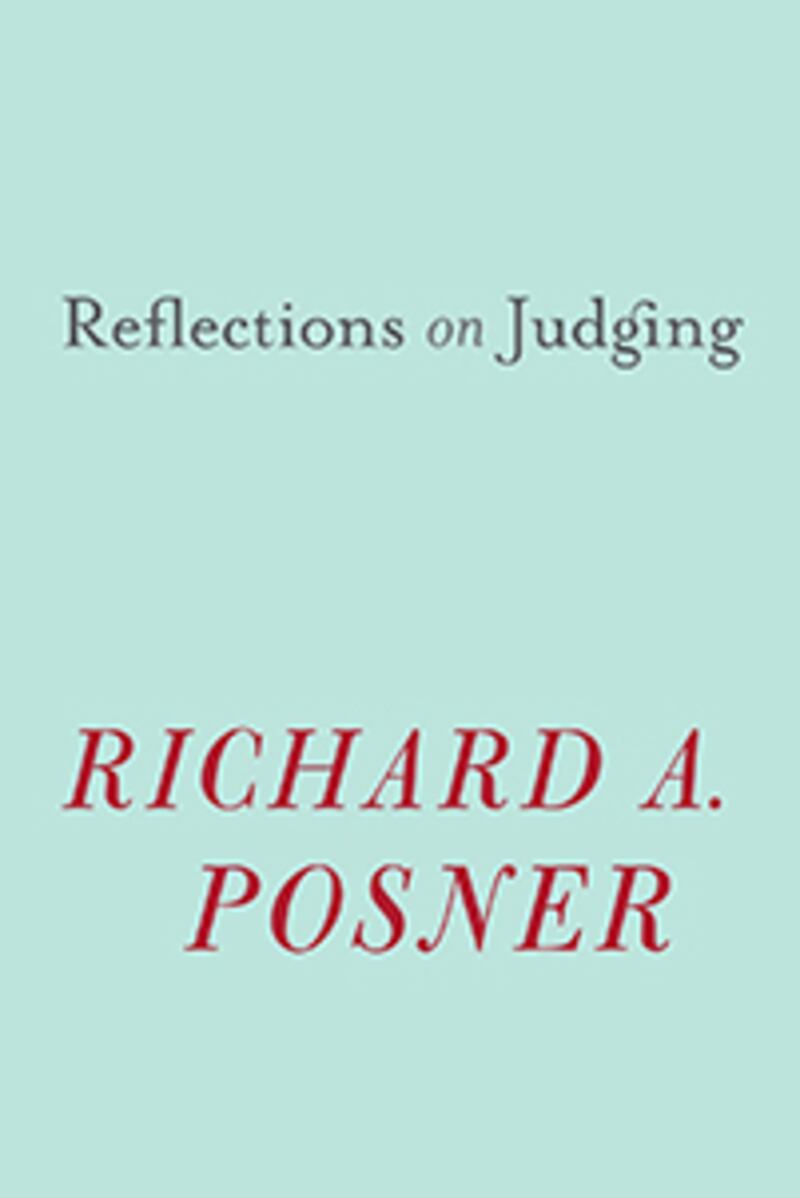Describe your morning routine.
I don’t really have any routines. Well, if I’m at home or in the office I have a desk and a computer. And I write. I’ve never thought in terms of any particular routine. There are a lot of interruptions, emails and so on. Whenever I have free time, I write. Judicial opinions or academic stuff. I don’t have any quota of words. I understand full-time novelists, say, they will want to do a certain amount of words a day in order to finish a book. Often it’s the same type of day, the same writing instruments. I’m not at all like that. I have to give priority to my judicial work, so when I write an opinion or when I’m editing, I always do my judicial work first.

You have the distinction of being the most cited legal scholar of the 20th century. My colleague, AJ Jacobs’ father, is in the Guinness Book of World Records for having written the legal article with the most citations. How do you feel to be so…well, cited?
Ha! I didn’t know that about myself! Well, it just shows I’m compulsive, right? I’m a compulsive writer. That’s funny. I am compulsive. I don’t do much else. I don’t take vacations. My wife and I don’t go out often. Sometimes for dinner or the theater, but not often. So I work weekends, nights. I have lots of time and I write. I am fast, I cover a lot of ground.
Who is a hero of yours in the annals of law?
I greatly admire Oliver Wendell Holmes. And other great judges that I like a lot. Cardozo and Brandeis and Henry Friendly, John Marshall.
Do you enjoy courtroom drama novels and films, or is it too close to home? What are some favorites that are both entertaining and realistic?
Going back to the Greeks, there’s the trial of Orestes in Aeschylus. In Shakespeare there are trials, in King Lear and The Merchant of Venice. There are trial-like legal proceedings in Measure for Measure. Melville’s Billy Budd, Kafka’s The Trial. Loads of them really. Camus’ L’Etranger.
How about some of the more contemporary ones? Do you enjoy Scott Turow or John Grisham?
I don’t care for Grisham. Scott Turow, I’ve read two of his books: Presumed Innocent and Innocent. Very well-written. He’s an experienced lawyer and his books are very authentic. He’s a very good lawyer, also a very good writer, so his work is very good. Recent people, like William Gadis. James Gould Cousins did excellent legal writing. I’ve written a book on law and literature. Oh, and The Bonfire of the Vanities. That’s very good. And there are some excellent movies. This must be from the early ‘40s, the Spencer Tracy and Katherine Hepburn, Adam’s Rib. That’s terrific. And Twelve Angry Men, with Henry Fonda. The Rumpole television series is excellent. Our judicial system is modeled on the English, but they are more theatrical, rhetorical, eloquent. They use our language better than we do, and there have been terrific English trial scenes in all sorts of movies and BBC shows. So there is a very rich fictional literature on law.

Were you ever tempted to write a legal novel?
The thought has crossed my mind occasionally, but no. It’s difficult. There are some famous first novels, but generally you need a lot of experience in writing fiction before you can really produce a worthwhile novel.
At this point in your career, would you like to sit on the Supreme Court?
No. First I’m too old. I’m 74 and they don’t appoint people my age.
But you sound peppy.
Well, I don’t like the Supreme Court. I don’t think it’s a real court. I think of it as basically…it’s like a House of Lords. It’s a quasi-political body. President, Senate, House of Representatives, Supreme Court. It’s very political. And they decide which cases to hear, which doesn’t strike me as something judges should do. You should take what comes. When you decide which case to hear it means you’ve decided the cases ahead of time. Also, because I’m a compulsive writer, I like to write. The way we hear cases, we occasionally have cases that all the judges sit on, but most of the time, we’re sitting in panels of three judges, so we split up the case among three judges. Sometimes I assign myself a little more than a third, because I’m selfish. But if you sit with eight other people [like the Supreme Court] you only get 1/9th of the cases to write. I’m not interested in that. Now the Supreme Court justices write very, very few majority opinions. Last year they saw 74 cases. Divide that by 9 and that’s a little more than 8 opinions a year. That’s ridiculous! I write around 90 opinions a year. I think they get up to an average of about 20 opinions per justice total. I don’t enjoy writing dissenting and concurring opinions, because once the case is decided, there’s very little interest in these other opinions. I just wouldn’t enjoy the Supreme Court. Absolutely no desire to be on it.
Tell us something about yourself that is largely unknown and perhaps surprising.
Well, I’m a very big cat person. Used to like dogs, then I switched. I have a big crush on my current cat. I like animals generally. I’m very soft about animals. My cat is a Maine Coon named Pixie. What’s unusual about her, besides being beautiful and intelligent, but she’s affectionate. Very unusual in cats. She likes to give us nuzzles and be with us. Her little face falls if either of us leaves the house. She’s very social. She appears to recognize members of our families, kids and grandchildren. She’s a real sweetie. It’s one of the reasons I work at home a lot now. The nature of my work is such that I don’t really have to be in the office unless I’m hearing cases. I spend probably at least half the time at home working. Everything I need, I have with me or have electronic access to. One reason is that the cat wants us at home.
What is guaranteed to make you laugh?
I like comedies.
Any one in particular?
There are loads. The premiere Shakespearean comedies, like Twelfth Night and A Midsummer Night’s Dream. George Bernard Shaw comedies. There’s Oscar Wilde, The Importance of Being Ernest, one of the funniest comedies ever. There’s the whole English comedic tradition. I guess it begins with Shakespeare, but it includes She Stoops to Conquer by Goldsmith.
What is guaranteed to make you cry?
I don’t cry! I don’t like grim books or movies, so I steer clear of them. I don’t like emotional things. Adventure is fine, but I don’t like things that are sad.
What would you like carved onto your tombstone?
Ha-hah! Well, I’m not planning to have a tombstone. I believe in cremation. No tombstone for me.
This interview has been edited and condensed.






